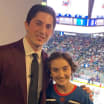Imagine growing up and being very good at your favorite pursuit. You have a passion for it, and you think you might be able to make a living in that field.
But here’s the catch. The best people in your chosen field live half a world away, in a place where you don’t speak the language or understand the culture. If you’re going to work among the best in the world, there’s no way around it – you have to move to this unfamiliar place.
That’s a decision Ivan Provorov made at 14 years old. One of the top young players growing up in Russia, often playing a year or two ahead in his age group, the Blue Jackets defenseman played a few tournaments in the United States at age 13. A year later, he and his father Vladimir made the discussion he’d move to the Scranton/Wilkes-Barre area of eastern Pennsylvania to chase his hockey quest.
“It was always my dream to play in the NHL,” said Provorov, who would play in the USHL and WHL before becoming a first-round pick in the 2015 draft. “My dad and I both thought that coming over here earlier would be beneficial, to have that adjustment all at once, by the time I was 18, 19, to get it out of the way. ... I think overall, for a lot of different reasons, it was the right choice for me.”
It's the reality that confronts the top Russian players in the world on a regular basis. Most do make the decision to come to North America, but there’s an adjustment period, followed by a certain comfort that comes once you get used to your new surroundings. For some, it’s a more difficult transition than others.
Blue Jackets forward Dmitri Voronkov has been the latest to go through it, making his way to North America this summer for the first time just as he turned 23 years old. He arrived with little knowledge of English, and he acknowledged that even as he was quickly settling into being an impact player in the NHL, his first few months were not easy.
He seems to have settled in, though, and is now one of the top rookies in the NHL. Even more importantly, his relationships with such CBJ Russian players as Yegor Chinakhov, Kirill Marchenko and Daniil Tarasov – and even fellow youngsters Alexandre Texier and Kent Johnson – have helped him feel more at home in Columbus.
In the end, the support system might be as important as anything, as the relationships the CBJ players have built have made Columbus an attractive NHL location despite being thousands of miles from home.
“If I was not comfortable, I wouldn’t live here,” Marchenko said. “I think for everybody, my goal was the NHL and to play in the best league in the world. Columbus really helped me with this plan. I like it here, of course. We have a lot of Russians. It’s great help for Chinny and Vorny. It’s a good community here and a good place here, too. I like it.”



















